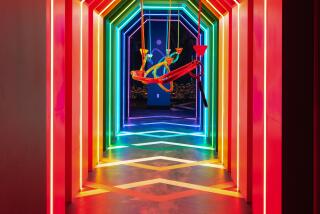Review: ‘Mario Kart Live’ tops ‘Pokémon Go’ for augmented reality and makes your home a playground
Supposedly, “Mario Kart Live: Home Circuit” is a toy that transforms your home into augmented reality-enhanced race tracks. At least that’s its stated purpose.
But, really, after half a year of largely staying inside 24-7, the Nintendo Switch accessory “Mario Kart Live: Home Circuit” has a power that I don’t think can be overstated. My 500-square-foot apartment long ago started to feel paralyzingly claustrophobic, but at long last it’s been re-imagined. As a mini remote-controlled Mario may say as he comes careening around a bend in my kitchen, “Ya-hoo!”
Simply booting up the game, even before its augmented reality capabilities are utilized, will result in a sense of wonder. Where there were metal-legged barstools now there are commanding, chrome skyscrapers, hinting at a towering, imposing cityscape. My wooden kitchen cabinets have become a quaint neighborhood filled with cozy chalets and nooks for parking.
Where there was once a storage area under the bed, now there are dark caverns with dead-end turns. A close-up view of a box spring reveals catacomb-worthy etchings seen above Mario, his perspective of my previously ordinary apartment now captured via a camera on a toy car and relayed to my Switch.
What ancient civilization drew these constellation-like figures into this wood and mesh? And, wait, is that a spider web? I‘d better reverse.
For me, these indoor neighborhoods are exactly two steps apart, or just a turn of my head and a squat. The game inspires such imagined sceneries simply with a switch in viewpoint. It saves the bulk of its AR enhancements for the actual races, and that’s when things get wild.
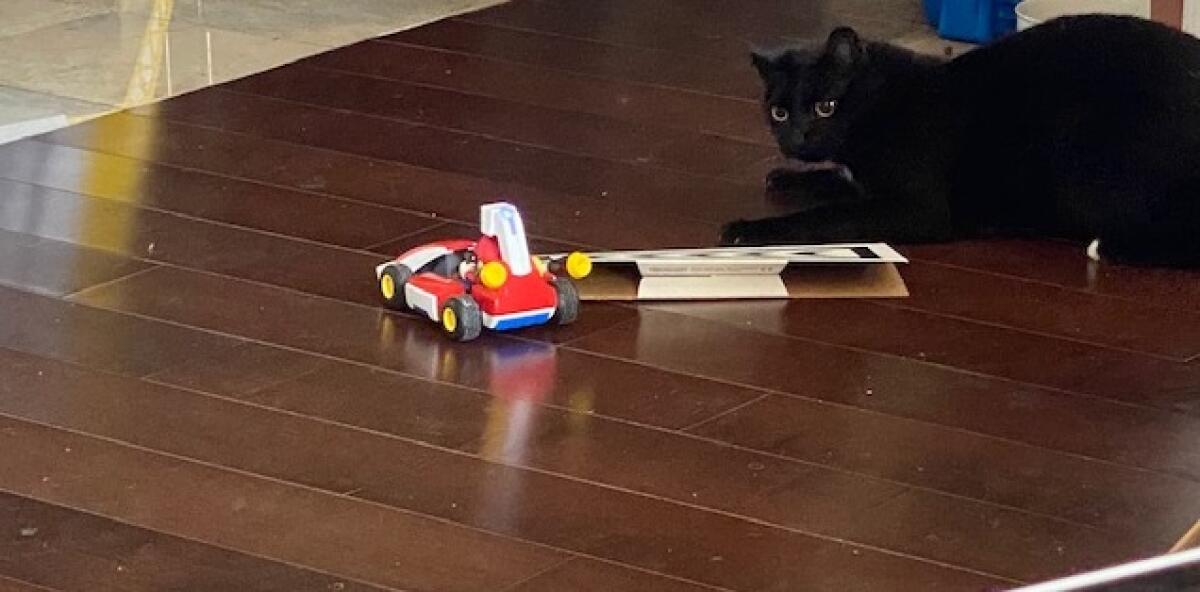
Underwater vistas, rainbow tracks, even a vintage video game backdrop appear as digital overlays in my tiny home once the races of “Mario Kart Live: Home Circuit” begin. An icy racecourse has my kart constantly running into frozen sculptures, each slowing me down and twisting me slightly off track. In an effort to avoid one, I overadjust and a wheel gets jammed in the floor pedal of a garbage can. When you’re a couple inches tall, your home is full of a whole new level of dangers.
But I was charmed by “Mario Kart Live: Home Circuit” even before it unleashed all its tricks. My trek from couch to bedroom is all of four steps. When the races are running, however, this little plastic kart with a Mario figurine must embark on a long, winding journey filled with virtual challengers and accouterments, as shifts in scale and some clever and surprisingly responsive uses of augmented reality have transformed my space into something otherworldly.
When racing, Mario’s journey can be perilous. Watch out for those giant magnets, piranha plants or chomping ball-and-chains. And while I continue to be delighted that driving my kart into virtual impediments has an actual effect on slowing or stopping it, this exuberant toy is also a reminder that our world, our home, is a vessel for many other universes. We just needed a change of perspective.
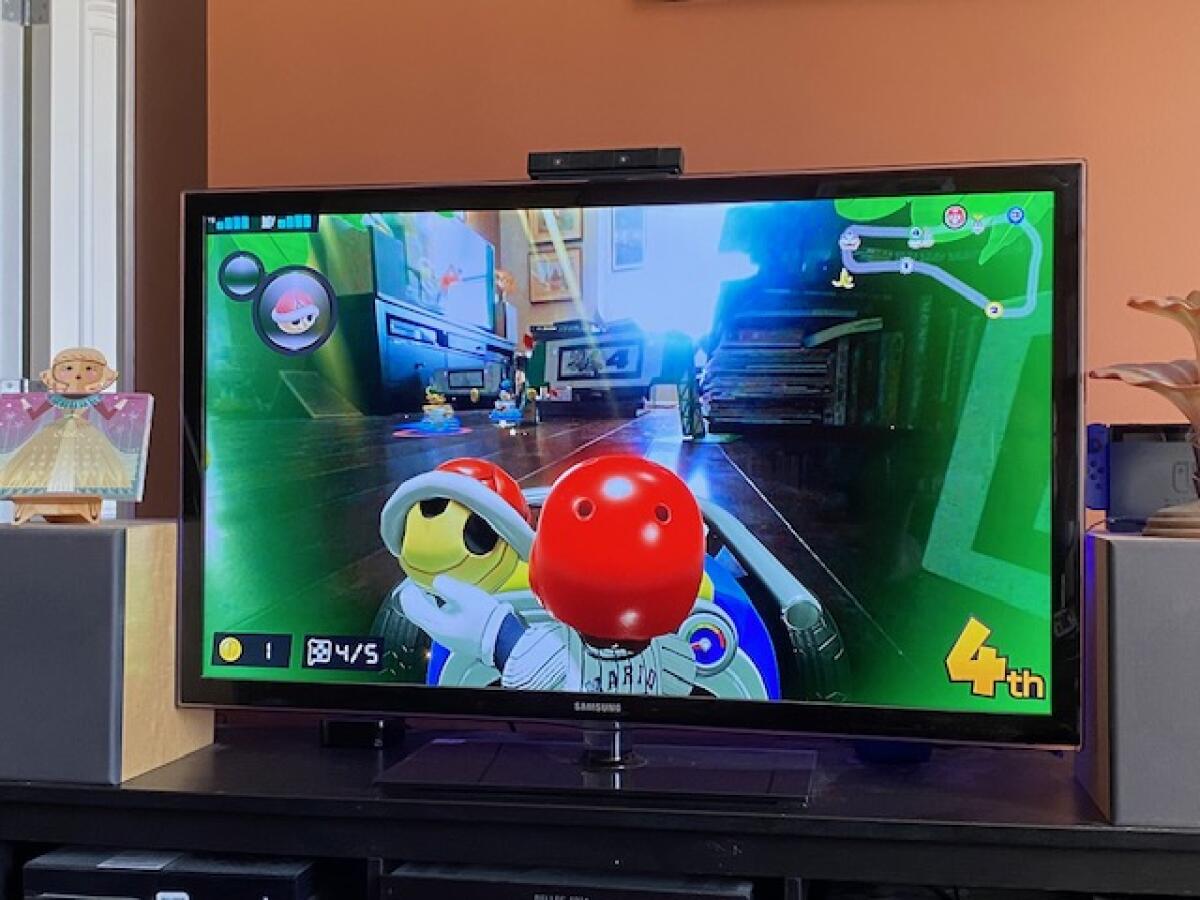
This is a big holiday season for video game players. In coming weeks we’ll have new consoles from Sony and Microsoft, each topping off at $500 and each looking to be impossible to find for quite some time. They will continue, no doubt, to enhance the way we interact with digital worlds. But I’m smitten with “Mario Kart Live: Home Circuit” because it has the exact opposite ambition, and one I would argue is even more powerful: to re-imagine our current one.
Augmented reality, along with virtual reality, has been teased as “the next big thing” for a number of years now, with the two trading hype cycles depending on the tech conference and the year. Since 2016’s release of the mobile smash “Pokémon Go,” however, we’ve been well attuned to the appeal of AR — through our phones we were able to see a universe full of creatures materialize. In the game space, however, nothing has matched the success of “Pokémon Go.”
My theory: We know nothing is actually there, and the novelty of seeing something appear when it has no environmental interactions wears off pretty quickly, especially when there isn’t a story — or a brand as powerful as “Pokémon” — to match. No wonder attention, at least when it comes to non-educational uses of AR, has turned recently to theme parks. If the pandemic hadn’t intervened this year, we would have had the opportunity to travel to Universal Studios Japan for an actual “Mario Kart”-inspired ride, one that many suspect will involve some use of AR.
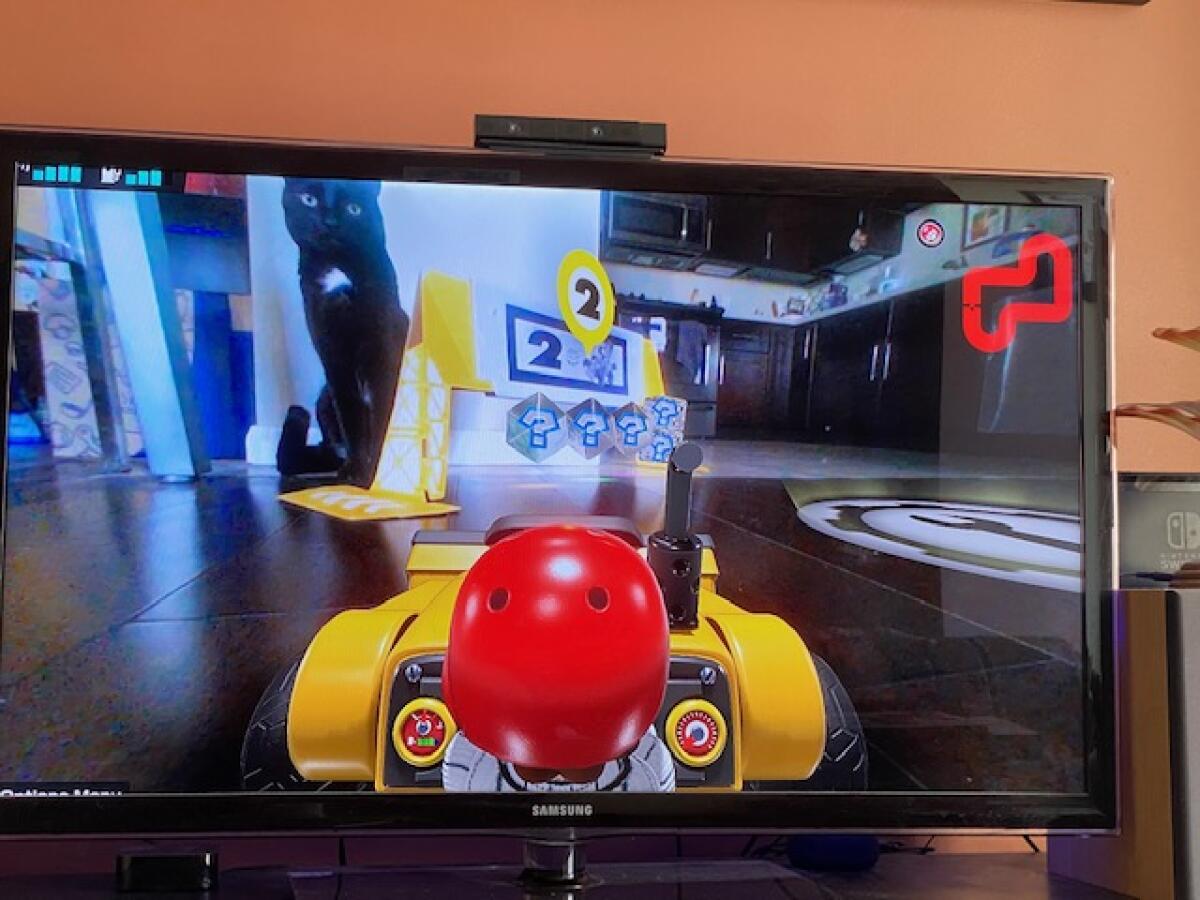
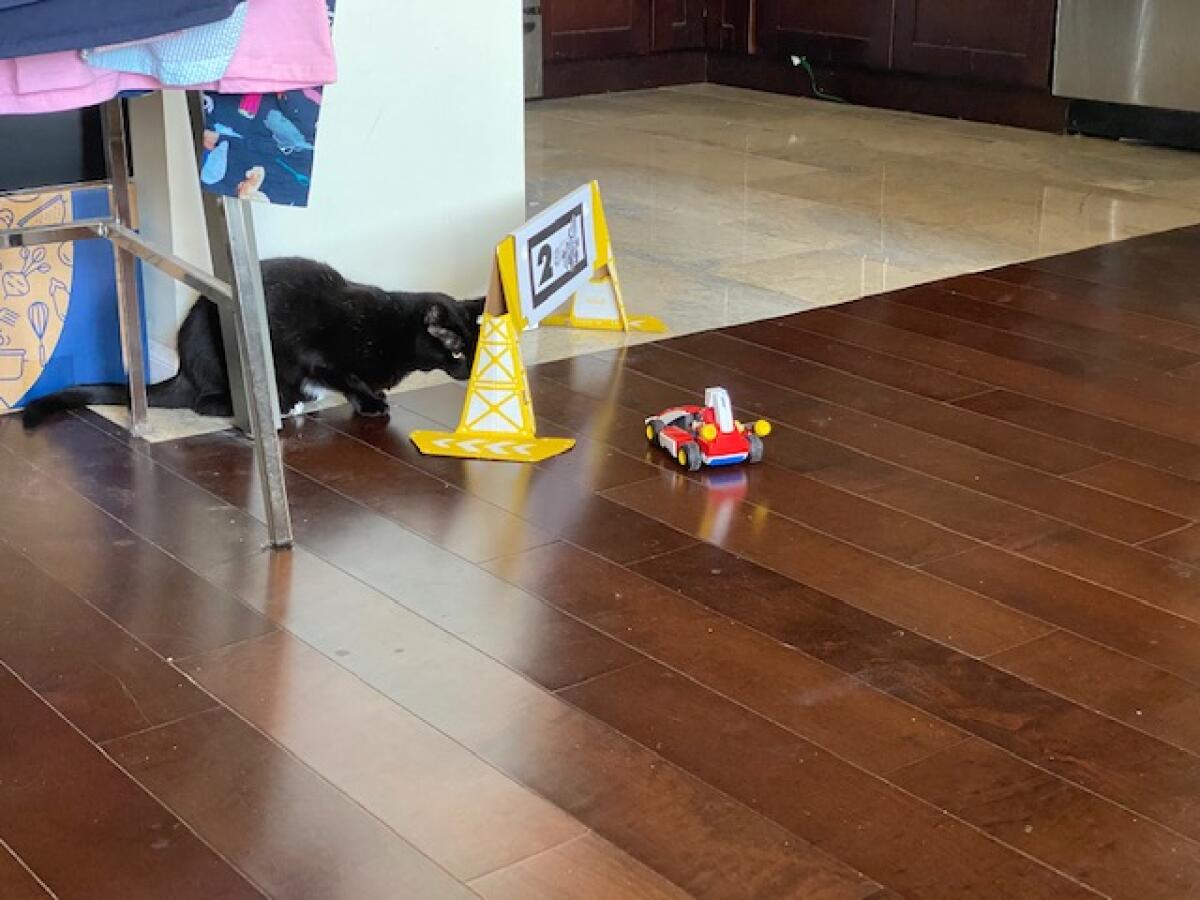
We won’t know until sometime next year — when Universal’s Super Nintendo World is expected to open — whether the rumors and the leaks are represented in the actual ride. But my first thought while playing “Mario Kart Live: Home Circuit” is that this feels like a take-home toy from a theme park as much as it does an add-on to my Switch.
It not only works, it solves the challenge of virtual creations interacting with — and changing — an item that exists in our physical world, in this case the kart. In short, “Mario Kart Live: Home Circuit” is an easy-to-play and accessible product that thrives outside of the tech demo space to make the argument that augmented reality has play applications that extend far beyond holding up our phone and looking at a virtual image.
But it isn’t cheap.
Nintendo celebrates 35 years of Mario with the rerelease of the first ‘Mario’ games to feature 3-D worlds, including the transformational “Super Mario 64,” the criminally underappreciated “Super Mario Sunshine” and the starry-eyed wonder of “Super Mario Galaxy.”
At $100 per set, you get one car, four gates and two racing signboards. All of them digitally transform when races begin (nondescript black-and-white cardboard arrows become colorful digital directional cues). You can race up to four players, but you’ll need four sets — and four Nintendo Switch consoles — to do so. Families with two or more young children may feel the crunch more than someone who lives alone with a cat (hand raised), but out of the box I believe one set offers opportunities for creativity beyond timed racing competitions.
It’s up to you, for instance, to design the course, which should avoid carpeted spaces. My kart had no problem racing from family room to kitchen to bedroom to bathroom and back, maintaining a connection throughout a concrete-walled downtown Los Angeles apartment. But even as a solo player I’ve had fun challenging myself with winding tracks through tight corridors, underneath shelving and custom-adding my own series of challenges and power-ups.
The little kart handles better than I expected, albeit not perfectly. But “Mario Kart” games aren’t designed to be simulations, so the fact that a windy prairie course has my cart constantly veering left and right adds just the right amount of chaos.
Making tight turns will require the use of drift. I create a figure eight around an air purifier and a cat fountain (I’m sorry, a waterfall!), and without pressing the drift button my kart always heads straight into the closet. Utilizing drift, however, Mario handles the curves and then does a little virtual wheelie (the kart is represented digitally on the Switch screen, giving Mario a number of cartoon-like reactions, including sleeping if I set the Switch down).
It should be noted that my kart has taken a fair beating over the last week and a half, and there is nary a scratch on it. The actual kart, despite the speed we specify for the race, is moving relatively slowly. Viewed through the screen, however, Mario appears blazingly fast. This can create a mental disconnect if you try to watch both the kart in real life and the kart on the Switch screen.
The biggest letdown is that Nintendo doesn’t allow players to take screenshots of the game. While a danger of augmented reality games is that people will use them to take less than flattering photos of intellectual property, a key appeal of such games is to capture the characters we love in the settings we live in. To deprive fans of this feature, one that is likely of special interest to those with pets, is a mistake. Nintendo, as part of its reviewer’s agreement, also forbade media from taking close-up shots of the screen, hence the clunkily framed photos in this story that actually fail to do the game justice.
Still, “Mario Kart Live: Home Circuit” is a welcome addition to my home. Trapped in my apartment with an abundance of video games, Zoom calls, digital experiences and online conferences, I’m downright exhausted when it comes to looking at a screen and pretending I’m participating in an actual social activity. What I need is entertainment that allows my home to feel like it’s something and someplace else entirely. Like a rainbow-enhanced road.
'Mario Kart Live: Home Cicuit'
More to Read
The biggest entertainment stories
Get our big stories about Hollywood, film, television, music, arts, culture and more right in your inbox as soon as they publish.
You may occasionally receive promotional content from the Los Angeles Times.
